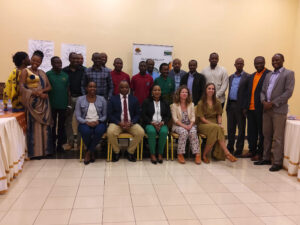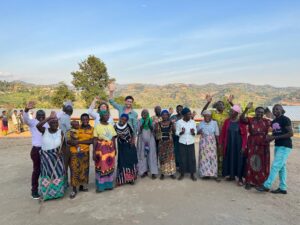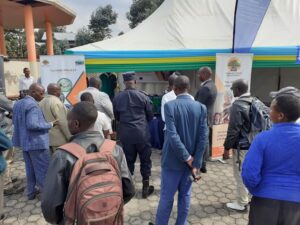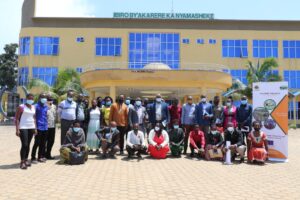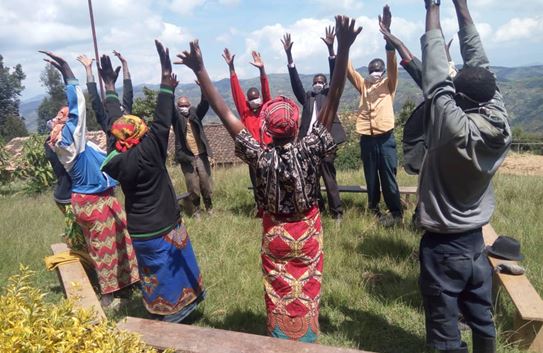
Mvura Nkuvure allowed Rwandans to experience mental liberation opting for new life orientations
By Felibien Hirwa Tuzayisenga
Rwanda celebrates its 27th Liberation. It was on the 4th of July 1994, that Rwanda was officially liberated from the politics of discrimination and divisionism. In the aftermath of the genocide against the Tutsi, the Government of Rwanda put a lot of efforts in establishing unity and reconciliation. One of the key elements in that process is the mental liberation from the painful past. The wounds that were inflicted obviously take a long time to heal. Community-based sociotherapy, or as Rwandans call it, Mvura Nkuvure (Heal me, I heal you), is one of the approaches that aims at contributing to mental liberation from the past. In this article we look at what liberation means for Mvura Nkuvure participants.
From the time when Mvura Nkuvure was introduced in Rwanda, 16 years ago, more than 40 thousand people from 12 districts (listed alphabetically: Burera, Gasabo, Gicumbi, Huye, Karongi, Muhanga, Nyabihu, Nyamagabe, Nyanza, Nyarugenge, Rubavu, and Rulindo) have participated in Mvura Nkuvure sessions.
Mvura Nkuvure graduates indicate that being part of the group sessions served as an entrance towards a new life. They reveal that in a journey of 15 weeks, group members receive opportunities to share painful experiences and to listen one another in safe spaces through open and frank dialogues facilitated through six sociotherapy phases: safety, trust, care, respect, new life orientations and memories. These dialogues often lead to (asking for) forgiveness, which ultimately allows participants starting new life, overcoming the historical bitter experiences and related mental and social consequences. It leads to feeling liberated as they all move together towards the future, irrespective of what they went through in the past.
Jacqueline Mukamana is sociotherapist from Burera district, since 2019, she has so far facilitated eight Mvura Nkuvure groups. Mukamana said that when participants complete all 15 sessions they affirm that they feel mentally liberated. Mental liberation (Kubohoka ku mutima no mubitekerezo) are the repeatedly recurring words in testimonies during conviviality meetings (events organized after the completion of Mvura Nkuvure).
One of the signs that participants feel mentally liberated from the past, is that after completing Mvura Nkuvure sessions, they decide together to continue meeting as a group. They indicate that they trust one another, which is the basis of supporting each other through socio-economic initiatives. They state that it is also a way of preserving what the Rwandan liberation has achieved and strengthening the Ndi Umunyarwanda values.
Twiteze Imbere (literally translated as let’s develop ourselves) is the name of one cooperative that operates in Burera district, Cyanika sector, Kamanyana cell in Gasovu village. It is composed of Mvura Nkuvure graduates whom after completing the sessions felt mentally liberated and have decided to start a saving cooperative as a sign of unity. The cooperative comprises of genocide survivors, ex-prisoners and youth: descendants of genocide survivors and perpetrators.
The time they concluded the 15 sessions of Mvura Nkuvure, they were 12, but later four more members whom had not attended Mvura Nkuvure, joined the group as they could see the impact of Mvura Nkuvure. They have rent a plot of almost ten thousand square meters where they cultivate plums. They also plan to buy goats to permanently have fertilizers for their plums.
“…if I see His Excellence I would affectionately hug him, he provided guidance, mechanism and support allowing you and others to bring these community initiatives which have brought us from isolation to socialization, that is liberation…” – Marie Nabatesi Mvura Nkuvure graduate from Nyamagabe district, Cyanika sector, Karama cell, Mugamba village.
Nabatesi and her Mvura Nkuvure colleagues ended the 15 sociotherapy sessions in May 25th 2020. Nabatesi was nominated by the group members to lead the group when they started a cooperative to facilitate them to keep meeting and share information and mutual support. They were 14 participants and had different socio-historical backgrounds: survivors; ex-prisoners and family members who have genocide convicts in prisons.
The cooperative now has 50 active members, they started already the process to register their cooperative: Abasanamitima (mental healers). The group has become bigger and bigger gradually as community neighbors were inspired by the new lifestyle, changed behavior of Mvura Nkuvure graduates. Abasanamitima cooperative comprises now even youth (descendants of genocide survivors and perpetrators) as well as victims of family conflicts. The group doesn’t discriminate, everyone is welcome. Mvura Nkuvure graduates in this cooperative, have started facilitating newcomers and taking them through Mvura Nkuvure phases.
Nabatesi said that they do savings regularly and have managed to secure domestic ruminants for every single member of the cooperative. “We are no longer mentally or socially isolated, we feel liberated and open to one another. Working together will help us to reach far from where we are now”, she added.
“…When attending Mvura Nkuvure, we are sitting together, talking to each other, and sharing emotions related to painful experiences. We do this despite our different historical backgrounds. We feel liberated and the Rwandan liberation day reminds us of that….” – Jean Paul Sekamana.
Sekamana is from Gasabo district, Bumbogo sector, Mpuzuzu cell in Akabenijuru village. His group members graduated in September 2020. After understanding the essence of “New Life Orientations” (the fifth Mvura Nkuvure phase) they found it worthwhile to stay together and support one another. Dusasirane (the literal translation paraphrased is ‘let’s jointly dress our beds’) is the name of this group, mutual supporting is the motive of the members.
They have so far managed to save money and buy mattresses for members who didn’t have them. They supported each other by cultivating each other’s lands and later started cultivating tomatoes, green beans, and maize together. They also bought sheathings (waterproof casing) to collect water for plants watering and spraying agricultural pesticides. In the future they want to buy pumps, boots and modern pesticides to reach to an advanced level of agribusiness. These different socio-economic initiatives of the group members are expressions of how Rwanda is progressing after its liberation 27 years ago and that besides the liberation of the country, the mental liberation of its people is possible when people come together in safe spaces where they can share their stories.

